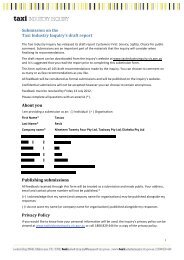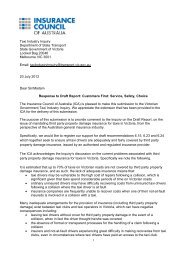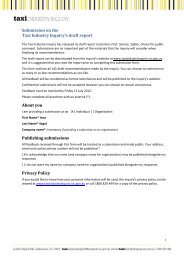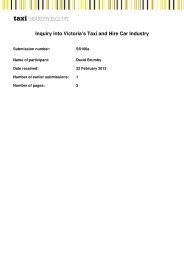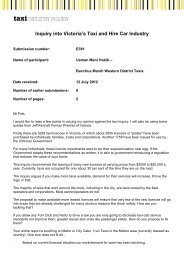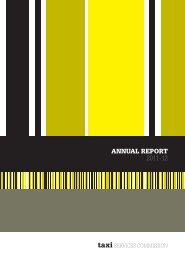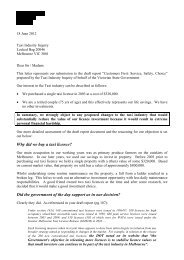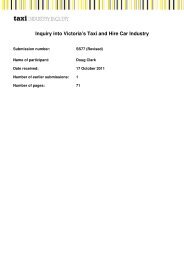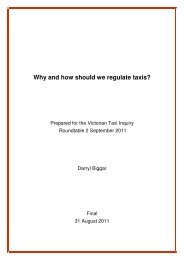Part D â Understanding and improving industry performance (PDF ...
Part D â Understanding and improving industry performance (PDF ...
Part D â Understanding and improving industry performance (PDF ...
Create successful ePaper yourself
Turn your PDF publications into a flip-book with our unique Google optimized e-Paper software.
Chapter 11.<br />
11. Networks<br />
Key messages<br />
• The role of Network Service Providers (NSPs)<br />
is a critical area that must be addressed in<br />
order to deliver sustainable taxi reform.<br />
• There is considerable consumer<br />
dissatisfaction with the quality, reliability <strong>and</strong><br />
accountability of booking services provided<br />
by NSPs.<br />
• Government intervention in this market in the<br />
form of the taxi <strong>industry</strong> accreditation scheme<br />
has failed to result in measurable improvements<br />
for taxi consumers <strong>and</strong> the objectives of<br />
accreditation have not been achieved.<br />
• There is confusion as to the role of NSPs <strong>and</strong><br />
the Government in ensuring service quality<br />
<strong>and</strong> scope to better clarify roles.<br />
• There is scope to reduce regulatory burdens<br />
on networks by rationalising existing regulation<br />
affecting them whilst at the same time clearly<br />
indicating areas of responsibility.<br />
• The current high barriers to entry in becoming<br />
a new NSP prevent new competitors from<br />
emerging <strong>and</strong> deliver minimal benefit to taxi<br />
users or taxi operators.<br />
• The current fee structure for affiliating with<br />
NSPs is inefficient <strong>and</strong> is a result of the<br />
imbalance of bargaining power between<br />
suppliers (NSPs) <strong>and</strong> consumers (taxi<br />
operators) in this market.<br />
• Introducing more competition to the market<br />
for taxi booking services is likely to increase<br />
innovation, encourage better marketing of<br />
taxis as a transport option <strong>and</strong> deliver higher<br />
quality <strong>and</strong> greater choice for consumers.<br />
• Taxi operators will also benefit from increased<br />
competition in the market for network services<br />
by having greater bargaining power to obtain<br />
improved choice <strong>and</strong> better value for money.<br />
In Victoria, the centralised booking<br />
<strong>and</strong> dispatch of taxis is delivered by<br />
companies known as network service<br />
providers (NSPs).<br />
While customers may hail taxis directly on the street or<br />
obtain a cab by waiting at a rank, they can also book a<br />
taxi by contacting an NSP.<br />
The inquiry has heard from many taxi users <strong>and</strong> <strong>industry</strong><br />
participants about their concerns <strong>and</strong> experiences<br />
regarding NSPs. The main themes raised with the inquiry<br />
are dissatisfaction with the reliability <strong>and</strong> accountability of<br />
booking services provided by Melbourne NSPs <strong>and</strong> the<br />
effects of current market dominance of the larger NSPs.<br />
Customers consider that NSPs lack accountability for<br />
service st<strong>and</strong>ards <strong>and</strong> many taxi operators <strong>and</strong> drivers<br />
perceive that NSPs deliver poor value for money for the<br />
services they provide to the <strong>industry</strong>.<br />
This chapter sets out the concerns raised with the inquiry<br />
about NSPs <strong>and</strong> pre-booked taxi services. This chapter<br />
analyses criticisms that networks lack accountability<br />
for the services they provide <strong>and</strong> identifies areas where<br />
failures in regulation have led to a market typified by<br />
weak competition <strong>and</strong> unsatisfactory levels of customer<br />
service. Finally, this chapter considers options for reform<br />
to address these problems in Victoria, as well as reforms<br />
undertaken in other jurisdictions.<br />
11.1. Introduction<br />
With over 5,000 taxis operating across Victoria, NSPs<br />
have for many years provided the link between drivers<br />
of taxis <strong>and</strong> customers wishing to book a taxi. NSPs<br />
bring many small taxi operators together with one<br />
single point of contact for customers. NSPs coordinate<br />
communications within an otherwise de-centralised<br />
<strong>industry</strong> by accepting bookings from customers <strong>and</strong><br />
transmitting booking details to a data terminal installed<br />
in taxis.<br />
Under legislation that has been in effect for many years,<br />
all taxis are required to be affiliated with an NSP. This<br />
is known as m<strong>and</strong>atory affiliation. While not a stated<br />
objective of the legislation, the inquiry underst<strong>and</strong>s that<br />
this affiliation requirement is in place to facilitate universal<br />
access for customers booking taxis <strong>and</strong> to provide a<br />
mechanism to track vehicles to ensure the safety of<br />
passengers <strong>and</strong> drivers.<br />
The taxi <strong>industry</strong> accreditation scheme that was<br />
introduced in 2007 <strong>and</strong> applies to NSPs has not achieved<br />
its objective to provide a safe, efficient <strong>and</strong> reliable taxi<br />
service with regard to NSPs.<br />
222



